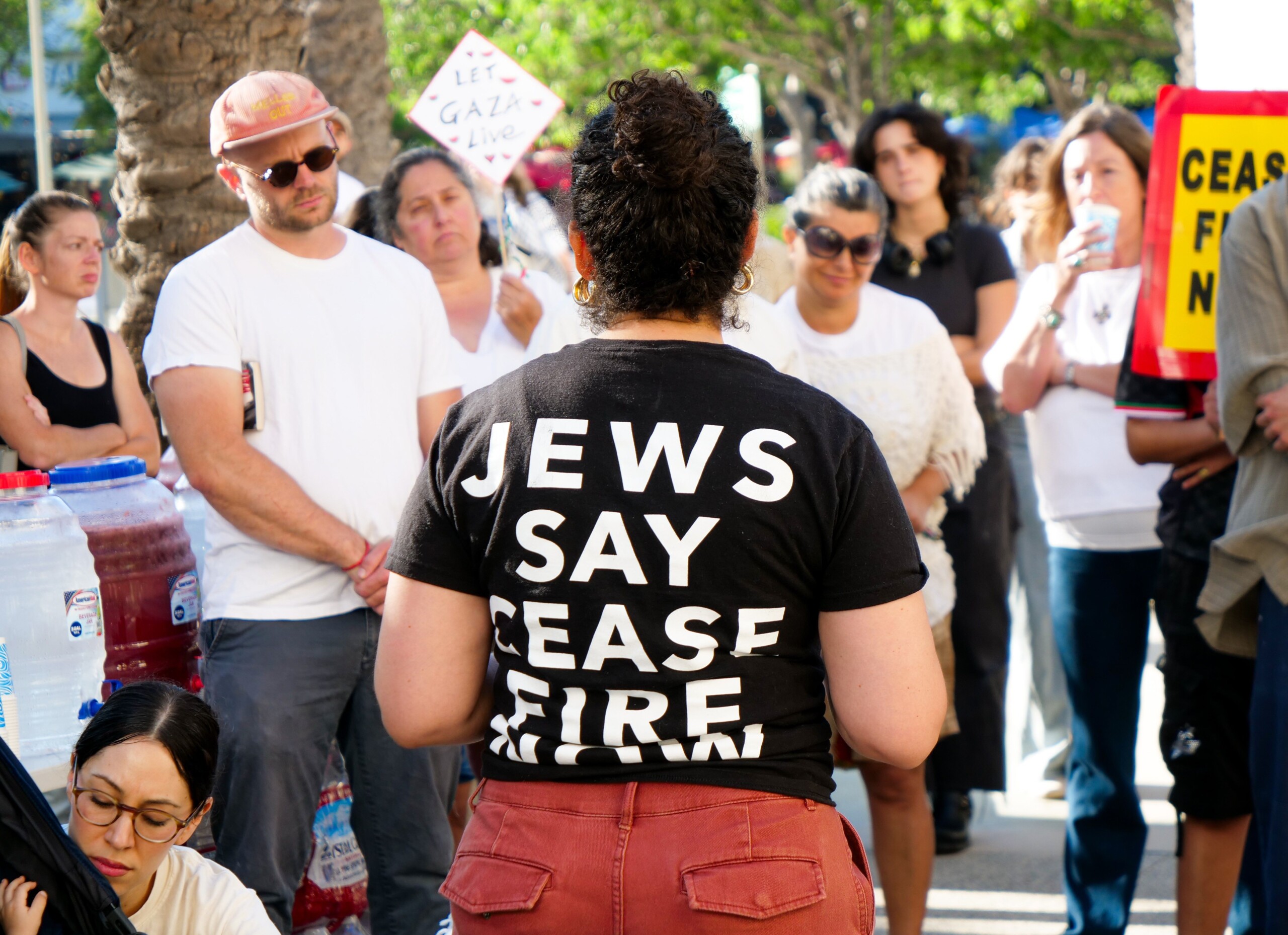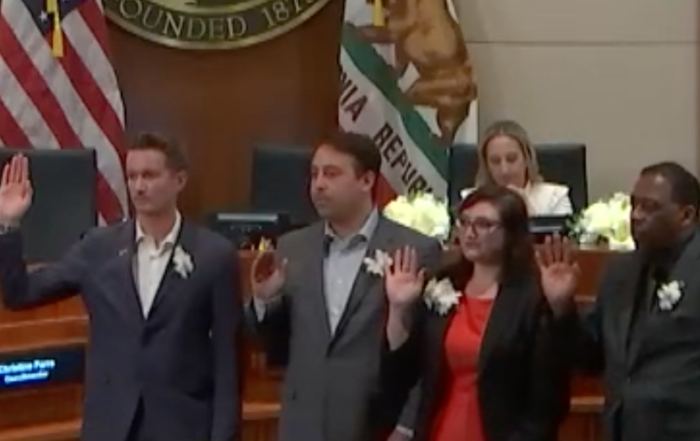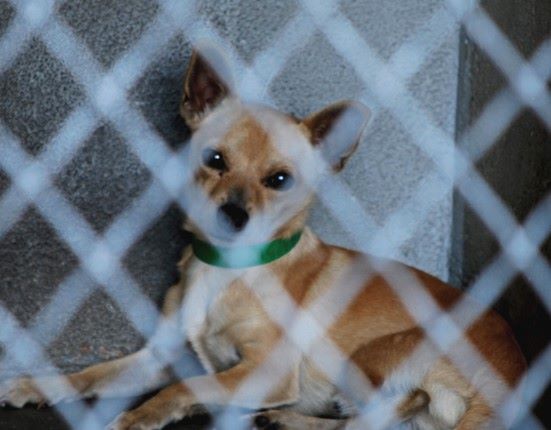On Monday, Culver City for Peace gathered at the Culver City Council meeting asking the council to agendize a ceasefire resolution. Since the Israel-Hamas War began, 16 cities in Southern California and 172 cities across the U.S. have passed resolutions calling for a durable and lasting ceasefire, the release of hostages taken on October 7, and the release of Palestinian prisoners.
Over 100 supporters for a ceasefire rallied in front of City Hall before the meeting. Supporters were business owners, lawyers, physicians, veterans, religious leaders, students, and teachers in the city who wanted to make their case for peace.
More than 40,000 Palestinians have been killed by the Israeli Defence Force (IDF) since the war began 312 days ago, including more than 10,000 children. In Gaza, 1.9 Million people have been displaced and face catastrophic levels of food insecurity and lack of medical care. Over 1,200 people were killed in Israel by Hamas fighters on October 7. It is estimated that 115 hostages remain in Gaza.
In February, community members attempted to get a ceasefire on the agenda but were refused by council members. In October, the council passed a resolution condemning the October 7 attack and calling for the release of hostages. The resolution acknowledged that thousands of Palestinians had been killed and expressed “Deep concern for the innocent civilians of Gaza who themselves are victims of Hamas and are suffering the consequences of their terror campaign.” By October 25, the U.N. reported more than 7,000 Gazans had been killed by the IDF.
The council passed it – Mayor Yasmine-Imani McMorrin was absent from the vote, with the other members voting unanimously.
Majed Dakak, an officer of the Arab-American Lawyers Association of Southern California, contended the council’s argument against voting on a ceasefire resolution was flawed. When community members approached council members about a ceasefire resolution, he said members responded, “‘Culver City has no bearing on international matters,’” adding “The problem with that is, that contradicts the truth.” Culver City had already – and recently – waded into international waters.
Their literal distance from the war did not diminish the reality that it was having a profound effect on the city. To many who spoke on Monday, a ceasefire resolution had obvious and devastating relevance to the people of Culver City. Muslim, Jewish, and Christian speakers asked the council to agendize a ceasefire resolution. People with loved ones in Palestine and Israel spoke in favor of Culver City passing a resolution.
While grieving their family members and friends who have been killed in the last ten months and long before, Palestinian-Americans spoke to the council about the need for an immediate end to the bombing of Gaza.
Emily Dibiny recounted her years of service to the city and the deeply woven connections she has to the schools and city government. She served on committees, she volunteered with the PTA. She knew council members personally.
“Do any of these acts seem to you as the behavior of an extremist or a terrorist? Or a community member?” she asked. She and others detailed anti-Palestinian racism they have experienced in Culver City.
“I am a Palestinian Christian… I lost family members when Israel bombed the church in Gaza. 29 people died.” She held up pictures of some of the people killed in the bombing. “I only have two hands, I can’t carry the photos of all of them.”
More than 40 people spoke in favor of a ceasefire resolution. Of the handful of speakers who disagreed, they largely argued the resolution would be both insignificant and harmful.
Marci Baun asked the council to do nothing. “I don’t think that passing a resolution is going to do anything. I don’t feel like it’s right for a bunch of people to come and push their decision onto our small city.” She claimed that in her experience the city had always been welcoming to everyone.
Most of the speakers who supported the ceasefire were from Culver City, many had lived there for decades, while some had been born there or started their families there.
Samantha Mohammed, a physician of Mexican and Palestinian heritage, said she had hoped to harvest olives with her family in Palestine. Because of the war, she won’t be able to visit her family for the foreseeable future. “I’ve heard our voices don’t matter, that this is not important to Culver City, but knowing that my tax dollars are going towards the killing of my own family, that’s impossible.”
Tasneem Noor, a teacher, talked about the impact the war has had on students. “While such a resolution may do little to change politics and conditions in Palestine and Israel, what this resolution does do is tell us, the residents of Culver City, that there is no space for binary thinking, no space for division, or hate in our city,” she said.
Some speakers disagreed. Al B., who identified as a “Proud Zionist,” said “What all these racist, pro-Hamas antisemites want is to murder all the Jews under the disguise of a ceasefire resolution. I don’t oppose a ceasefire per se, as long as it’s got the condition of releasing all the hostages.”
The ceasefire resolution proposed by Culver City for Peace explicitly calls for the release of hostages, as many of the speakers before and after Al B. mentioned.
Gary Zeiss, another attendee against a ceasefire resolution, said “It would be simply wrong for the city council to pick one side over the other.”
Speakers in support of a ceasefire resolution denied the existence of sides – at least in the way the conflict has been portrayed.
“Calling for peace, for a ceasefire should never be controversial,” Hala Khan said.
“I don’t think this is a ‘winning’ or ‘losing,’ I think that peace is a ‘win’ for everybody,” Conor Proffitt added later.
Photographer Jeffery Cooper lived in Gaza during the First Intifada. “I worked there openly as a Jew,” he said, without fear. During the meeting, he said everyone would suffer without a ceasefire. “Palestinians and Jews have been dying and will continue to die if this war continues. Every life is precious.”
Daniel Nickfardjam said being Jewish necessitated his stance against the indiscriminate killing of Palestinians. “Agendizing a ceasefire resolution is in no way an antisemitic act. In fact, it’s the most Jewish thing you could do, because it goes with the tenet of tikkun olam – to fix the world, to make this place better.”
Culver City council candidate Bubba Fish also gave his support for the ceasefire resolution.
“I once believed that my Jewish identity complicated my feelings on this conflict. I know now that it clarifies them. Judaism teaches us that all people are created b’tzelem Elohim, or in God’s image. So let it be known that we raise our voices tonight for our brothers and sisters in God’s image, and for our ancestors and all of our descendants to say, ‘never again, to anyone.’”
Since the council’s refusal to agendize the ceasefire resolution in February, the L.A. County Central Committee and the California Democratic Party have both passed ceasefire resolutions.
During public comment, Leah Pressman called for the council to align with their party. “Calling for a ceasefire in Gaza has been the official position of the California Democratic Party,” since the resolutions were passed earlier this year, Pressman said. “Opposing a resolution for a ceasefire in Gaza is now pretty much a fringe position among those who call themselves Democrats.” Pressman added that she and Culver City Unified School District (CCUSD) candidate Andrew Lachman were both involved in getting the county and state resolutions passed.
Consensus among Democrats has risen locally and within the national party. Westside supervisor Holly J. Mitchell and Vice President Kamala Harris have both called for a ceasefire.
Kelly Kent, president of the CCUSD school board but speaking on her own behalf, gave her support for bringing a ceasefire resolution to city hall. “There are many in our community who would like to hear you speak and honor Palestinians and call for a ceasefire in addition to a release of the hostages,” she said. “The people that I have seen and heard from who want this from you and us are tapping into all of their courage right now to be with you tonight to make these requests… Please know that the people you are hearing from supporting Gazans only represent some of the many.”
Palestinian-Americans and Jewish people were not alone in naming the importance of the council’s action or inaction on behalf of their constituents. Community members reported that openly supporting Palestine had made them targets for harassment and doxing. There have been concerted campaigns to target businesses and elected officials for expressing grief or solidarity with Palestinians.
After public comment, council members discussed approval for the Culver City United Against Hate Week in September.
Maria Beg, chair of the Muslim Bar Association, asked the council who the city’s anti-hate programming was designed to protect. The council stated it stood against antisemitism in its October resolution. It did not also condemn anti-Arab racism and Islamophobia. “There is hate within Culver City. And with all respect to this council, you are fueling that hate.”
Fawaz Istwani, longtime owner of Jackson Market in Culver City, has been a target since Jackson Market first expressed solidarity with the Palestinian people. Addressing the council, he said that groups had made negative reviews of his business en masse, made anti-Muslim statements about him and his customers, and called them “pro-Hamas.” Anti-Muslim sentiments were spreading, he said. “It’s getting hot. We need to tone it down in this city.”
After more than two hours of their constituents directly asking them to protect their families and neighbors from attacks abroad and in Culver City, the word ceasefire was not mentioned by any of the council members. The possibility of adding a resolution to the agenda for discussion was not broached.
Councilmember Albert Vera said, “I agree with many of the speakers, including Fawaz,” and said he would take meetings with community members to hear their concerns. Councilmember Freddy Puza said the city should also support its Arab and Muslim communities in its anti-hate messaging and campaigns. Councilmember Dan O’Brien said the meeting showed that what the city really needed was more open dialogue and that he heard community concerns that anti-hate programming was largely performative.
Mayor McMorrin said she hadn’t seen such a well-attended meeting since she was elected to the council.
It remains to be seen if the council will decide to place a ceasefire resolution on the agenda for their next meeting. Either way, Culver City for Peace will be back.
Photo by Our Own Christian May-Suzuki.
Stay informed. Sign up for The Westside Voice Newsletter
By clicking submit, you agree to share your email address with Westside Voice. We do not sell or share your information with anyone.








